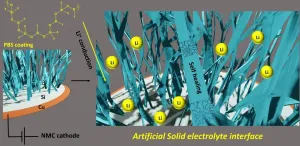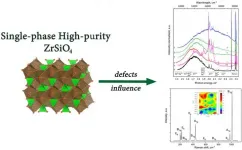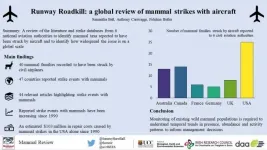(Press-News.org) Treating severe COVID-19 patients with the anticancer drug bevacizumab may reduce mortality and speed up recovery, according to a small clinical study in Italy and China that was led by researchers at Karolinska Institutet in Sweden between February and April 2020. On average, blood oxygen levels, body temperature and inflammatory markers significantly improved in patients treated with a single dose of bevacizumab in addition to standard care. The research is published in Nature Communications.
"To reduce COVID-19 mortality, we aim to develop an effective therapeutic paradigm for treating patients with severe COVID-19," says corresponding author Yihai Cao, professor of vascular biology at the Department of Microbiology, Tumor and Cell Biology at Karolinska Institutet. "Our findings suggest that bevacizumab plus standard care is highly beneficial for patients with severe COVID-19 and should be considered as a potential first-line therapeutic regimen for this group."
Bevacizumab is a medication that has been used to treat various types of cancer since 2004. It works by slowing the formation of new blood vessels by inhibiting a growth factor known as VEGF. Many patients with severe COVID-19 have elevated levels of VEGF as well as symptoms associated with this marker, including excess fluid and disorganized blood vessels in the lungs. Against this background, the researchers designed a clinical trial to investigate the effect of combining bevacizumab with standard care for treating patients with severe COVID-19.
Twenty-six patients were recruited from two hospitals in China and Italy between mid-February and early April in 2020. The patients had confirmed COVID-19 and symptoms such as difficulty breathing, low blood oxygen levels and pneumonia. They were retrospectively matched with 26 patients of similar characteristics who received standard care at the same hospitals in roughly the same time period and thus served as the control group.
The recruits received standard care plus a single low dose of about 7.5 mg/kg bevacizumab, which markedly improved blood oxygen levels within 24 hours compared to the control group. By the end of the 28-day follow-up period, 92 percent of the bevacizumab-treated patients no longer needed the same level of oxygen support as before the trial began, compared with an improvement rate of 62 percent for the controls.
None of the bevacizumab-treated patients died and 17 (65 percent) improved so much that they were able to leave the hospital within the follow-up period. In the control group, three died and only 46 percent were discharged within 28 days. Bevacizumab also shortened the duration of oxygen-support to a median of nine days compared with 20 for the standard care group.
Other interesting findings include reduction in fever, an increase in white blood cells and a sharp decrease of c-reactive protein (CRP) levels, an inflammatory marker. No severe safety concerns were detected.
"Many patients with severe COVID-19 require significant oxygen support during long hospital stays, which pose global challenges to medical supplies," Yihai Cao says. "Our study shows that bevacizumab could help reduce the need for oxygen support and reduce days in hospital, thus improving the outcome for the individual patient while easing pressure on medical resources."
The limitations of the study include the non-randomized nature of the trial, the short-term follow-up and the small size of the cohort.
The next step will be to design randomized and placebo-controlled trials by recruiting a large number of patients, allowing further assessment of the potential benefits of bevacizumab both in and of itself and in combination with other therapies such as antivirals and anti-inflammatory drugs.
INFORMATION:
The research was financed by the National Key R&D Program of China, the Shandong Provincial Key R&D Program, the European Research Council, the Swedish Research Council, the Swedish Cancer Foundation, the Strategic Research Areas (SFO)-Stem Cell and Regeneration Medicine Foundation, the Karolinska Institutet, the Swedish Children's Cancer Foundation, the Karolinska Institutet Foundation, the Torsten Soderbergs Foundation, the Maud and Birger Gustavsson Foundation, the Novo Nordisk Foundation and the Knut and Alice Wallenberg's Foundation.
Publication: "Efficacy and tolerability of bevacizumab in patients with severe Covid-19," Jiaojiao Pang, Feng Xu, Gianmarco Aondio, Yu Li, Alberto Fumagalli, Ming Lu, Giuseppe Valmadre, Jie Wei, Yuan Bian, Margherita Canesi, Giovanni Damiani, Yuan Zhang, Dexin Yu, Jun Chen, Xiang Ji, Wenhai Sui, Bailu Wang, Shuo Wu, Attila Kovacs, Miriam Revera, Hao Wang, Xu Jing, Ying Zhang, Yuguo Chen, Yihai Cao, Nature Communications, online Feb. 5, 2021, doi: 10.1038/s41467-021-21085-8
A research team led by Prof. HE Shunping from the Institute of Hydrobiology (IHB) of the Chinese Academy of Sciences has discovered through genome sequencing that the non-teleost ray-finned fishes--bichir, paddlefish, bowfin and alligator gar--exhibit mosaic genomic features of lobe- and ray-finned fishes. The study was published in Cell.
The water-to-land transition during the Devonian is one of the most prominent events in vertebrate evolution. During this transition, various organs underwent adaptive changes, particularly those related to locomotion and respiration systems.
Rich fossil evidence suggests that many traits and functions related to this terrestrial evolution were present long before the ancestor of lobe- and ray-finned fishes ...
Although silicon anodes could greatly boost the capacity of Li-ion batteries, their performance rapidly degrades with use. Polymeric coatings can help solve this problem, but very few studies have explored the underlying mechanisms. In a recent study, scientists from Japan Advanced Institute of Science and Technology investigate how a poly(borosiloxane) coating greatly stabilizes the capacity of silicon anodes, paving the way for better and more durable Li-ion batteries for electric cars and renewable energy harvesting.
Since their conception, lithium-ion batteries (LIBs) have been constantly improved and adapted so that they can become suitable for vastly different applications, from mobile devices ...
Researchers from the Department of Infection and Immunity of the Luxembourg Institute of Health (LIH) brought forward the potential of high doses of a specific adjuvant molecule, namely CpG oligonucleotide, in successfully modulating the immune system's allergic response to the main cat allergen Fel d 1, thereby inducing a tolerance-promoting reaction and reverting the main hallmarks of cat allergy. The researchers analysed the molecular mechanisms underlying this tolerance and proposed a pre-clinical allergen-specific immunotherapy approach to improve the treatment and control of this common type of allergy. The full study results ...
Sudden cardiac arrest is more often fatal in people with COVID-19, a new study shows. Those responsible for the research see the results as a wake-up call for the public and care providers alike.
The survey now published in the
European Heart Journal is a register-based observation study. It covers all 3,026 cases of sudden cardiac arrest that were reported to the Swedish Registry for Cardiopulmonary Resuscitation in the period from 1 January to 20 July 2020 -- that is, both before and during the pandemic.
The Registry's statistics show that, in Sweden, there are 6,000 cases of sudden cardiac ...
Ozone is a problematic air pollutant that causes serious health problems. A newly developed material not only quickly and selectively indicates the presence of ozone, but also simultaneously renders the gas harmless. As reported by Chinese researchers in Angewandte Chemie, the porous "2-in-one systems" also function reliably in very humid air.
Ozone (O(3)) can cause health problems, such as difficulty breathing, lung damage, and asthma attacks. Relevant occupational safety regulations therefore limit the concentrations of ozone allowable in the workplace. Previous methods for the detection of ozone, such as those based on semiconductors, have a variety ...
Thermoelectric generators, TEGs for short, convert ambient heat into electrical power. They enable maintenance-free, environmentally friendly, and autonomous power supply of the continuously growing number of sensors and devices for the Internet of Things (IoT) and recovery of waste heat. Scientists of Karlsruhe Institute of Technology (KIT) have now developed three-dimensional component architectures based on novel, printable thermoelectric materials. This might be a milestone on the way towards use of inexpensive TEGs. The results are reported in npj Flexible Electronics (DOI: 10.1038/s41528-020-00098-1) and ACS Energy Letters (DOI: 10.1021/acsenergylett.0c02159).
"Thermoelectric generators directly convert thermal into electrical energy. This technology enables ...
The scientific novelty of the work of scientists from Ural Federal University, Institute of Solid State Chemistry and Geology and Geochemistry of the Ural Branch of the Russian Academy of Sciences lies in the fact that for the first time scientists solved the task of creating zircon with certain spectral properties. To this end, they have worked out the so-called sol-gel method.
It is distinguished by its technological simplicity, controllability of processes and allows synthesizing a larger volume of products with high purity than with other ...
Using patient data, artificial intelligence can make a 90 percent accurate assessment of whether a person will die from COVID-19 or not, according to new research at the University of Copenhagen. Body mass index (BMI), gender and high blood pressure are among the most heavily weighted factors. The research can be used to predict the number of patients in hospitals, who will need a respirator and determine who ought to be first in line for a vaccination.
Artificial intelligence is able to predict who is most likely to die from the coronavirus. In doing so, it can also help decide who should be at the front of the line for the precious vaccines now being administered across Denmark.
The result is from a newly published study by researchers at the University of Copenhagen's Department ...
- World's wildlife, from giraffes to voles, kangaroos to coyotes being hit by aircraft.
- Study identifies incidences at airports in 47 countries across the globe.
- 'Runway Roadkill' increasing by up to 68% annually and has caused damage that has cost in excess of $103 million in the United States alone over a 30 year period.
- It is hoped study could pave way for international efforts to protect wildlife and reduce costly aircraft damage.
From giraffes to the world's smallest mammals, the world's wildlife is being increasingly struck by aircraft, a global study finds.
Airports from Sydney to London and the USA to Germany were examined by researchers who ...
LEBANON, NH - Dartmouth's and Dartmouth-Hitchcock's Norris Cotton Cancer Center (NCCC) is the first cancer center in the world to install BeamSite Cherenkov imaging cameras in its radiotherapy treatment rooms. The camera system, invented, validated and commercialized by entrepreneurs from NCCC and Dartmouth spinoff biomed tech company, DoseOptics, LLC, captures imaging and real-time video of the beam directly on the patient, allowing the radiation oncology team to visualize treatment delivery.
Cherenkov imaging makes radiation treatment a visual process. The Cherenkov effect occurs when photon or electron radiation beams interact with tissue, such as skin, producing a small light ...






